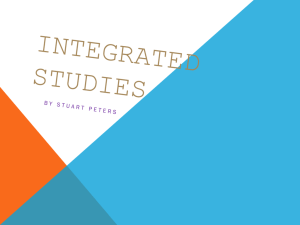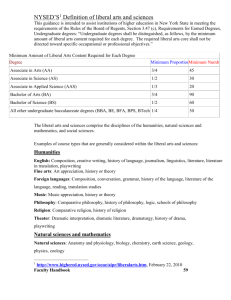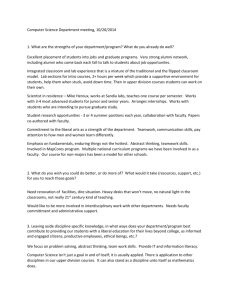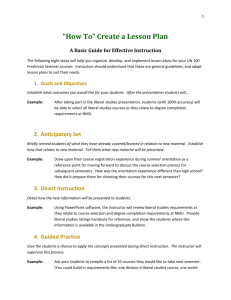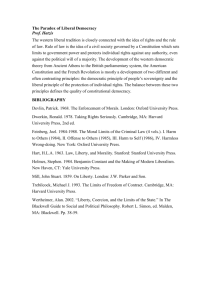File - the liberal arts perspective
advertisement
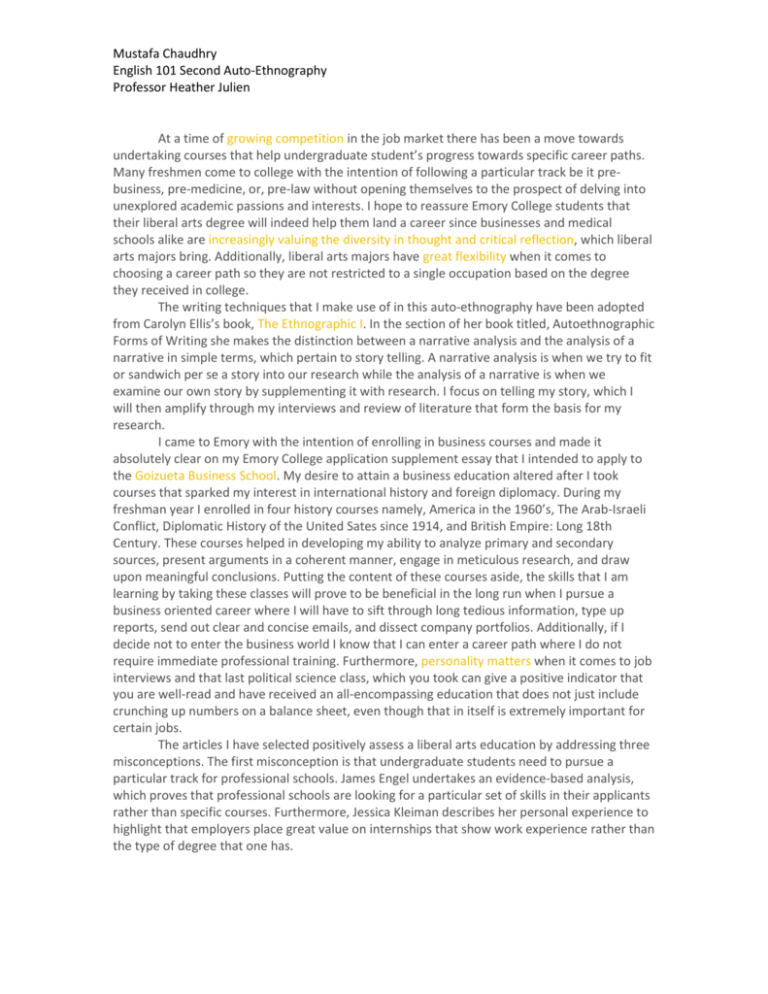
Mustafa Chaudhry English 101 Second Auto-Ethnography Professor Heather Julien At a time of growing competition in the job market there has been a move towards undertaking courses that help undergraduate student’s progress towards specific career paths. Many freshmen come to college with the intention of following a particular track be it prebusiness, pre-medicine, or, pre-law without opening themselves to the prospect of delving into unexplored academic passions and interests. I hope to reassure Emory College students that their liberal arts degree will indeed help them land a career since businesses and medical schools alike are increasingly valuing the diversity in thought and critical reflection, which liberal arts majors bring. Additionally, liberal arts majors have great flexibility when it comes to choosing a career path so they are not restricted to a single occupation based on the degree they received in college. The writing techniques that I make use of in this auto-ethnography have been adopted from Carolyn Ellis’s book, The Ethnographic I. In the section of her book titled, Autoethnographic Forms of Writing she makes the distinction between a narrative analysis and the analysis of a narrative in simple terms, which pertain to story telling. A narrative analysis is when we try to fit or sandwich per se a story into our research while the analysis of a narrative is when we examine our own story by supplementing it with research. I focus on telling my story, which I will then amplify through my interviews and review of literature that form the basis for my research. I came to Emory with the intention of enrolling in business courses and made it absolutely clear on my Emory College application supplement essay that I intended to apply to the Goizueta Business School. My desire to attain a business education altered after I took courses that sparked my interest in international history and foreign diplomacy. During my freshman year I enrolled in four history courses namely, America in the 1960’s, The Arab-Israeli Conflict, Diplomatic History of the United Sates since 1914, and British Empire: Long 18th Century. These courses helped in developing my ability to analyze primary and secondary sources, present arguments in a coherent manner, engage in meticulous research, and draw upon meaningful conclusions. Putting the content of these courses aside, the skills that I am learning by taking these classes will prove to be beneficial in the long run when I pursue a business oriented career where I will have to sift through long tedious information, type up reports, send out clear and concise emails, and dissect company portfolios. Additionally, if I decide not to enter the business world I know that I can enter a career path where I do not require immediate professional training. Furthermore, personality matters when it comes to job interviews and that last political science class, which you took can give a positive indicator that you are well-read and have received an all-encompassing education that does not just include crunching up numbers on a balance sheet, even though that in itself is extremely important for certain jobs. The articles I have selected positively assess a liberal arts education by addressing three misconceptions. The first misconception is that undergraduate students need to pursue a particular track for professional schools. James Engel undertakes an evidence-based analysis, which proves that professional schools are looking for a particular set of skills in their applicants rather than specific courses. Furthermore, Jessica Kleiman describes her personal experience to highlight that employers place great value on internships that show work experience rather than the type of degree that one has. Mustafa Chaudhry English 101 Second Auto-Ethnography Professor Heather Julien The second misconception is that the liberal arts do not equip us with relevant knowledge for a particular career. In lieu of the abovementioned Annette Gordon-Reed mentions that a liberal arts education is geared towards equipping us with the ability to adapt to different jobs and circumstances. This as Edgar Bronfman points out is an essential skill in the rapidly changing business world. The third misconception is that a liberal arts education is for a privileged few attending select educational institutions. Scott Samuelson, a philosophy teacher at a community college disproves this when he highlights how his courses have enabled people to cope with their problems and realize their aspirations. Additional Information Edgar Bronfman describes the growth of a competitive job market that has led to the move towards a pragmatic university education that is focused on helping undergraduates obtain a well-paying job as opposed to teaching them for the mere sake of teaching. He encourages students to get a liberal arts degree since it will equip them with the ability to understand facts and figures beyond their immediate significance, which can only happen when one has the ability to think from different perspectives as opposed to a single business minded viewpoint. In this short yet informative article, Jessica Kleiman outlines her college experience as a Communication and English major at the University of Michigan. She took a broad range of classes that she found interesting and still managed to land internships and a prestigious job posting. She assures liberal arts majors that they stand a good chance of securing a job even in this competitive market as long as they are willing to work hard, develop connections, and secure internships while continuing to study subjects that excite them. Annette Gordon-Reed, a prominent historian at Harvard University argues that a liberal arts degree equips you with a skill set that can be implemented in a range of different jobs, which is beneficial given the relatively unstable job market. Therefore, students who focus on gaining employment in a specific sector by choosing majors that are catered towards acquiring a certain job will not have the ability to adapt to different roles within any other career. With this in mind college students should take an extensive range of courses in various disciplines. In this article James Engel outlines the benefits of a liberal arts education on an undergraduate level as opposed to undertaking a pre-professional track. He supplements his argument with advice from professors that have held high-level positions in graduate schools like Harvard Business School and The University of Pennsylvania Law School. In conclusion, the article states that a liberal arts education will offer the best preparation for professional schools and high-level careers since real-world scenarios, which graduates will face in their respective fields will not have standardized solutions thereby necessitating innovative thinking. A Philosophy professor attempts to answer the question as to why people should study topics that are of no immediate practical significance to them by making the case for why he teaches plumbers Plato at a community college. The professor argues that when his students are exposed to Philosophy it helps them to in certain cases, realize their true potential and unlock talents or interests that they might not have known existed. This in turn enables some of the students at the community college to excel in life and in certain cases cope with their difficult situations. Mustafa Chaudhry English 101 Second Auto-Ethnography Professor Heather Julien First Interview My first interview is with Atif Niaz who is a rising sophomore at Emory College double majoring in Biology and Classics. Atif came to Emory College with the intention of taking a wide variety of science courses in addition to completing pre-requisite courses for the pre-medicine track. This changed however when Atif took a classics seminar in his freshman year. What advice do you have for pre-medicine students that are looking to major outside of the usual science majors? Don’t be afraid to explore! Medical schools (and other graduate schools and employers) are looking for well-rounded applicants. Of course, a big part of being a doctor is to understand the underlying science affecting one’s patients. However, there is so much more to being a successful doctor than that! It is good to know that James Engell makes the case that Medical schools are not looking for applicants with an intensive base of science courses other than the required pre-requisite courses. Putting your enthusiasm for Classics aside how do you think your Classics major will help you when it is time to apply to medical school? I think it will help by showing that I am able to learn in more ways than one, and that, as alluded to above, I am a more ‘well-rounded’ applicant than someone who has say, only studied sciences. In addition, I have been told that studying gross anatomy will be far easier with knowledge of Latin, as many of the structures in the body are named in Latin. Also, let us be honest, there is nothing more awesome than a Classics major, so I am probably guaranteed to get in anywhere (laughs). On a side note like Scott Samuelson I believe that a liberal arts education should not be made available to just a privileged few only especially when it can have a wide ranging impact. Mustafa Chaudhry English 101 Second Auto-Ethnography Professor Heather Julien Second Interview My second interview is with Taimour Sheikh who is a rising sophomore at Emory College majoring in Political Science. Taimour and I attended the same high school in Lahore, Pakistan. Taimour applied to Emory College with the intention of majoring in Business with a concentration in accounting. I talk to him about how his initial interest in accounting changed after he took an Introduction to Comparative Politics course in his freshman year. How did you develop an interest for Political Science at Emory College and what drew you to the subject? Political Science has taught me a great deal of history, economics and philosophy. I realized it would be best if I study a subject that focuses on these different yet inter-related themes. With this in mind I think that Annette Gordon-Reed correctly identifies a liberal arts education as one that is broad based in nature since it touches on a range of different subject matters. You were initially set on applying to the Business School so what changed your mind? In high school, I had studied accounting and was therefore keen on learning it further. However, taking business courses and political science courses simultaneously made me realize that there was very little room for intellectual discussion in business school courses. Asking meaningful questions that change the way I think and positively affect my personality is something that I cherish. I was not able to do this with business school courses. Edgar Bronfman is a really successful entrepreneur so if he agrees with my opinion that a business education at the undergraduate level encourages the proliferation of a single and at times narrow outlook then I must be doing something right (laughs). How have your Political Science courses been meaningful to you? The courses have taught me what makes great leaders. My favorite course at Emory so far has been POLS 150: Foundations of American Democracy. This course allowed me to critically analyze Pakistani politics by comparing it to the American political system. Mustafa Chaudhry English 101 Second Auto-Ethnography Professor Heather Julien Third Interview My third interview is with Imman Akram, a rising junior at the Goizueta Business School. This interview was both short and interesting. How did you manage to secure a top-notch internship for the summers? I initiated a conversation on American foreign policy and its implications on international trade with my interviewer, who was impressed that I had something different to say from the other applicants. I guess I owe my internship to a Political Science course I took a semester back. I must admit though I thought the course would have been of no specific use for advancing my immediate career goals. You told me that you disagree with what James Engell had to say about a liberal arts education. Why is that? James Engell I feel speaks on behalf of the select few who attend top-notch institutions such as Harvard and Yale. Just like we sometimes trust a brand based on its reputation alone, employers hire liberal arts graduates from ivy-league schools with confidence. Similarly, even though I agree with Jessica Kleiman that internships are an extremely important, she fails to take into account the fact that community colleges and certain universities do not have the same repute that comes with an ivy-league education. Therefore, getting a job becomes increasingly difficult unless you can prove that you are specialized for a particular profession. Is there anything else that you would like to add? I admit that the business school at Emory is geared towards landing you a job and is extremely competitive however; I feel that it teaches you more than just an analysis of say, accounts or stock portfolios. We have for instance, seminars that improve our leadership skills, allow us to develop conversational etiquettes for business meetings, and help us understand world events in relation to the business world. Artifact Analysis Writing a thesis driven, well-structured, and well-developed research paper assignment forms a critical component of some liberal arts courses. My short analysis serves to elaborate upon how to undertake a research paper assignment. Naturally, this analysis is from the perspective of a prospective history major. If we have a big base of primary sources to use for our research paper, then the best thing we can do is to make our argument from those primary sources and use secondary sources to back up our broader claims. In other words, we must be careful to construct our narrative and arguments from the primary sources rather than the secondary sources. This is in line with the “let your research speak for itself", principle, which I embraced when writing a research paper on the British East India Company for one of my history classes. In some undergraduate classes however, we might be asked to do a research paper that is based on secondary sources. Whenever this is the case, it is necessary to compare different arguments about a single historical topic. This means that we must read several books, not necessarily from cover to cover in order to figure out the different kinds of arguments that the authors are making. In certain cases this is also referred to as a historiographical essay as opposed to a research paper.


